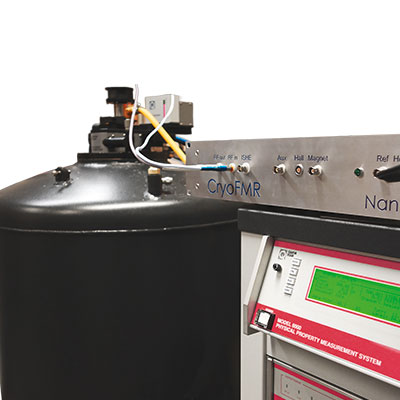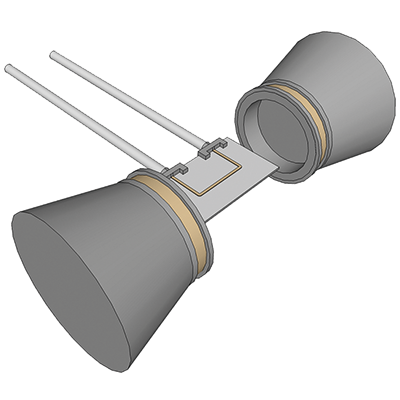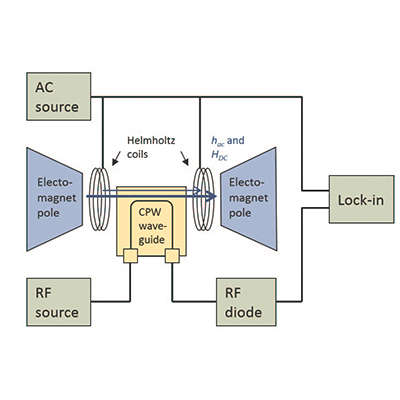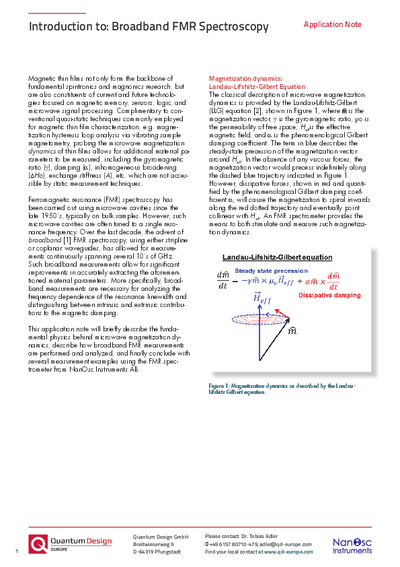Ferromagnetic resonance spectroscopy (FMR)
PhaseFMR from NanOscThe PhaseFMR from NanOsc measures the ferromagnetic resonance of a magnetic thin film sample and derives its fundamental properties from these measurements. The instrument offers an affordable, plug-and-play, and easy to use solution for magnetodynamic measurements and the ability to investigate novel phenomena such as spin pumping, the spin Hall effect, and the inverse spin Hall effect (ISHE). It comes ready with all microwave and detection hardware, as well as measurement and analysis software. The only thing needed is a computer, a magnet, and the power supply for the magnet, which can be delivered by us upon request.
- Frequency range: 2 - 8 GHz, 2 - 18 GHz, 2 - 40 GHz, and 2 – 60 GHz (prel.)
- Measures ultra-thin films down to 2 nm
- No external microwave or detection instruments needed
- Labview interface
- Low-Temperature Version, the CryoFMR
Further information
The ferromagnetic resonance (FMR) of a magnetic thin film is a fundamental property for any high-frequency magnetic and spintronic application, such as hard drive read-heads, MRAM, spin torque MRAM, and spin torque oscillators. PhaseFMR measures the ferromagnetic resonance at different applied magnetic fields and its analysis software extracts:
- Saturation magnetization (Ms)
- Intrinsic damping (α)
- Inhomogeneous broadening (ΔH)
- Gyromagnetic ratio (γ/2π)
In magnetic nanostructures, other higher spin wave modes may dominate and a complete understanding of these modes is necessary for final device operation and reliability. PhaseFMR measures the location and field dependence of such modes.
Coplanar waveguide ferromagnetic resonance (CPW-FMR) is a spectroscopic technique that takes advantage of the coupling between an RF signal traveling in the CPW, and the oscillating magnetization of a sample sitting on top of it. When a ferromagnetic sample is placed in a constant uniform external field (HDC), its magnetization will align along the direction of the applied field. It is then possible to excite a percession of the sample magnetization by applying a small RF field at an angle to the direction of magnetization.
Since the resonance frequency fFMR of the magnetization depends on the local field, sweeping the external field while holding the frequency of hrf constant will yield an absorption spectrum corresponding to the FMR response at that particular frequency.
Furthermore, if we refer to the Kittel formula for thin films with an in-plane magnetization and negligible anisotropy,

we can see that for this geometry it is possible to extract the saturation magnetization Ms or the gyromagnetic ratio γ. Finally, the linewidth of the peak can be used to extract parameters of the dynamic behavior of the spin excitation, such as the intrinsic damping α and the inhomogeneous line broadening ΔHo.
Applications
The PhaseFMR instrument has excellent signal-to-noise performance and allows FMR measurements of ultra-thin films. As reference, CoFeB films down to 2 nm are readily measured.

The PhaseFMR has already been integrated into different cryostats, namely the PPMS family from Quantum Design, including PPMS, DynaCool and VersaLab. For the Cryostation s50 from Montana Instruments with magnet-option the user is able to combine the PhaseFMR with the cryostat on his own . The low temperature versions of the PhaseFMR are called CryoFMR. For integration with the QD cryostats, a dedicated modified multifunction probe with Helmholtz coils was developed. NanOsc Instrument provides two CPWs for analysis of thin films with in-plane and out-of-plane magnetic fields together with the complete integration in the PPMS family cryostats.
Downloads
Downloads
Contact
| +49 6157 80710-479 | |
| +49 6157 807109479 | |
| Write e-mail |






